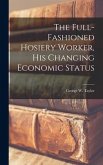By 2000, clubs in NSW Australia collectively operated
around 75,000
gaming machines or 8 per cent of high intensity machines
worldwide. This study examines how these clubs have
strategically
managed the issue of problem gambling. Stage One
traces the
development of machine gambling in these
not-for-profit venues
and explains how increased commercialisation
diminished their
social contract and exacerbated problem gambling.
Stage Two
analyses how other factors also fuelled the emergence
of problem
gambling as a significant social issue. Stage Three
considers the
relevance of theoretical and applied models of social
responsibility
to NSW clubs in addressing problem gambling. The
fourth and fifth
stages draw on interviews, case studies and a survey
to assess how
NSW clubs interpreted their social responsibilities
in gambling by
the late 1990s, while Stage Six assesses their
congruence with
stakeholder expectations. The seventh stage considers
implications
of key developments during the late 1990s which saw
the clubs
stance evolve from reluctant acceptance to pragmatic
involvement
when faced with government inquiries and responsible
gambling
legislation.
around 75,000
gaming machines or 8 per cent of high intensity machines
worldwide. This study examines how these clubs have
strategically
managed the issue of problem gambling. Stage One
traces the
development of machine gambling in these
not-for-profit venues
and explains how increased commercialisation
diminished their
social contract and exacerbated problem gambling.
Stage Two
analyses how other factors also fuelled the emergence
of problem
gambling as a significant social issue. Stage Three
considers the
relevance of theoretical and applied models of social
responsibility
to NSW clubs in addressing problem gambling. The
fourth and fifth
stages draw on interviews, case studies and a survey
to assess how
NSW clubs interpreted their social responsibilities
in gambling by
the late 1990s, while Stage Six assesses their
congruence with
stakeholder expectations. The seventh stage considers
implications
of key developments during the late 1990s which saw
the clubs
stance evolve from reluctant acceptance to pragmatic
involvement
when faced with government inquiries and responsible
gambling
legislation.








